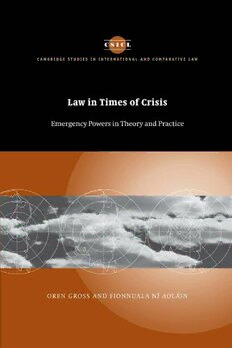
Law in Times of Crisis: Emergency Powers in Theory and Practice PDF
517 Pages·2006·2.041 MB·English
Most books are stored in the elastic cloud where traffic is expensive. For this reason, we have a limit on daily download.
Preview Law in Times of Crisis: Emergency Powers in Theory and Practice
Description:
The terrorist attacks of September 11, 2001, and the ensuing 'war on terror' have focused attention on issues that have previously lurked in a dark corner at the edge of the legal universe. This book presents a systematic and comprehensive attempt by legal scholars to conceptualize the theory of emergency powers, combining post-September 11 developments with more general theoretical, historical and comparative perspectives. The authors examine the interface between law and violent crises through history and across jurisdictions, bringing together insights gleaned from the Roman republic and Jewish law through to the initial responses to the July 2005 attacks in London. Three models of emergency powers are used to offer a conceptualization of emergency regimes, giving a coherent insight into law's interface with and regulation of crisis and a distinctive means to evaluate the legal options open to states for dealing with crises.
See more
The list of books you might like
Most books are stored in the elastic cloud where traffic is expensive. For this reason, we have a limit on daily download.
